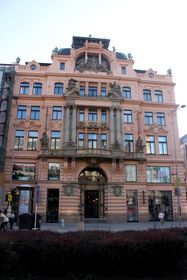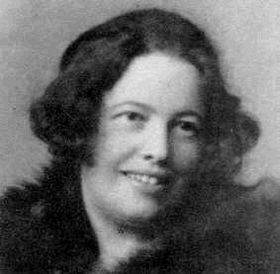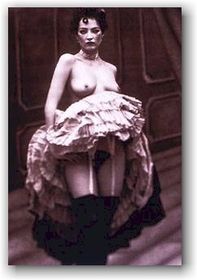Wenceslas Square 19, Nové Město
 Assicurazzioni Generali
Thanks to Kafka's uncle, who pulled some strings, Kafka wound up working for the Prague branch of the Italian insurance company Assicurazioni Generali. On the first of October 1907 Kafka began work in this gigantic insurance company that was founded in 1831 and operates to this day. For many years it had various branches in Prague, and finally in 1896 the company built a neo-baroque palace on the corner of Wenceslas Square and Jindřišská street, on the spot of the imposing late renaissance building U Císařky – which had to be torn down, to the despair of experts and lovers of old Prague. Osvald Polívka finished the palace according to the plans of Friedrich Ohmann, who worked for many years in Prague as a professor of decorative architecture. The five story Prague palace, with its two courtyards, was one of the most magnificent sites outside of Italy. Its monumental façade displays statues by famous sculptors and it entrance hall is richly decorated. Not long ago the building went through a massive reconstruction, redoing the whole interior, even the room on the fourth floor where Kafka spent his first months on the job.
Assicurazzioni Generali
Thanks to Kafka's uncle, who pulled some strings, Kafka wound up working for the Prague branch of the Italian insurance company Assicurazioni Generali. On the first of October 1907 Kafka began work in this gigantic insurance company that was founded in 1831 and operates to this day. For many years it had various branches in Prague, and finally in 1896 the company built a neo-baroque palace on the corner of Wenceslas Square and Jindřišská street, on the spot of the imposing late renaissance building U Císařky – which had to be torn down, to the despair of experts and lovers of old Prague. Osvald Polívka finished the palace according to the plans of Friedrich Ohmann, who worked for many years in Prague as a professor of decorative architecture. The five story Prague palace, with its two courtyards, was one of the most magnificent sites outside of Italy. Its monumental façade displays statues by famous sculptors and it entrance hall is richly decorated. Not long ago the building went through a massive reconstruction, redoing the whole interior, even the room on the fourth floor where Kafka spent his first months on the job.
 Hedwig Weiler
To Miss Hedwig Wiler, a young Jewish girl he had fallen in love in Třešť he wrote: „Now in the office. I am employed with the Assicurazioni Generali and have the hope despite everything of seeing myself seated in a comfortable office chair in distant lands some day, looking out onto sugar cane fields or Mohammedan graveyards from the office window, and insurance itself interests me a lot, but the work I’m doing at the moment is dreary. And yet it’s sometimes quite nice to put down my pen and to imagine placing one of your hands on top of the other and enfolding them with one of my hands and to know now that I wouldn’t let them go, not even if someone were to unscrew my hand at the wrist.“
Hedwig Weiler
To Miss Hedwig Wiler, a young Jewish girl he had fallen in love in Třešť he wrote: „Now in the office. I am employed with the Assicurazioni Generali and have the hope despite everything of seeing myself seated in a comfortable office chair in distant lands some day, looking out onto sugar cane fields or Mohammedan graveyards from the office window, and insurance itself interests me a lot, but the work I’m doing at the moment is dreary. And yet it’s sometimes quite nice to put down my pen and to imagine placing one of your hands on top of the other and enfolding them with one of my hands and to know now that I wouldn’t let them go, not even if someone were to unscrew my hand at the wrist.“
It took only a few weeks before Kafka started to look around for a new position. Kafka worked as supplemental assistant daily from eight in the morning until – not seldom – eight thirty at night with only seven days paid vacation per year and eighty crowns monthly salary.
He wrote to his acquaintance in Třešť: “My life is a complete mess now. While I have a job with a negligible salary of 80 crowns and endless eight to nine hours workdays, I gorge on my hours outside of work like a wild animal. Since up to this point I haven’t been accustomed to squeezing my life into six hours a day, in which I also study Italian and want to spend the evenings of the glorious days in nature, I came out of the packed days only slightly refreshed… I don’t know if I’ll be transferred abroad but it won’t be earlier than a year at least. The best would be if I could switch companies – it’s not completely out of the question.”
After less than half a year at Generali, Kafka completed a four month course at the German Business Academy at Meat Market Street on workers insurance, in order to improve his qualifications in a field that Generali did not even cover. And after nine months at Generali, he handed in his resignation – allegedly for health reasons, but really because of the working conditions and the required change in his daily routine – and took a job at the Workers Accident Insurance Institute for the Kingdom of Bohemia at 7 Na Poříčí.
 Kafka tried to compensate for whatever boredom and desperation the daily grind caused with all kinds of diversions and entertainment at night. He saw himself suddenly „thrust among a crowd of people“, attended film, operetta, and cabaret performances and patronized wine bars, music halls, and night clubs. Naturally waitresses, girls of the demi-monde, and prostitutes belonged to this new varied life: "…but otherwise I must so urgently look for someone who would just touch me in a friendly way, that yesterday I went to a hotel with a prostitute. She is too old to still be melancholy, she’s only sorry – even if it doesn’t surprise her – that prostitutes are not treated with love the way a woman who’s having an affair is. I didn’t console her, since she did not console me." There is even a photo of one of the wine bar acquaintances Kafka made – Brod compared her to the „Germania-figure on the postage stamps of the German Reich“. The girl’s name was Hansi Julie Szokoll and Kafka made the observation that whole cavalry regiments had ridden over her body.
Kafka tried to compensate for whatever boredom and desperation the daily grind caused with all kinds of diversions and entertainment at night. He saw himself suddenly „thrust among a crowd of people“, attended film, operetta, and cabaret performances and patronized wine bars, music halls, and night clubs. Naturally waitresses, girls of the demi-monde, and prostitutes belonged to this new varied life: "…but otherwise I must so urgently look for someone who would just touch me in a friendly way, that yesterday I went to a hotel with a prostitute. She is too old to still be melancholy, she’s only sorry – even if it doesn’t surprise her – that prostitutes are not treated with love the way a woman who’s having an affair is. I didn’t console her, since she did not console me." There is even a photo of one of the wine bar acquaintances Kafka made – Brod compared her to the „Germania-figure on the postage stamps of the German Reich“. The girl’s name was Hansi Julie Szokoll and Kafka made the observation that whole cavalry regiments had ridden over her body.
In the years before the Great War, Prague was permeated by a sultry, lascivious, and decadent atmosphere that was greedily sucked up by writers like Paul Leppin and spread out in front of a grateful readership in mawkish and erotic novels and novellas. Hundreds of street whores enticed potential clients, countless secret prostitutes provided fro the sexual well-being of Prague’s male world. Added to them were the establishments and salons known to all in town and even in works of literature, establishments like the „Šuha”, “Eldorado” or “London”, where hot coffee and scantily clad ladies beckoned. The most famous of these was probably the Salon Goldschmidt (the “Go-Go”), to which Franz Werfel later set a lasting monument in his novella Das Trauerhaus (The House of Mourning).
